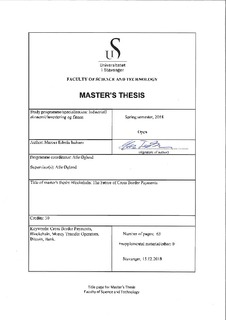Blockchain: The Future of Cross Border Payments
Master thesis
Permanent lenke
http://hdl.handle.net/11250/2587148Utgivelsesdato
2018-12-15Metadata
Vis full innførselSamlinger
- Studentoppgaver (TN-ISØP) [1441]
Sammendrag
Bitcoin developed a trustless monetary system, without the need of intermediaries. Bitcoin has been expected to threaten banks traditional monetary systems. The underlying technology, blockchain, is a profound technology that presents a decentralized database technology. The technology is suitable for exchanging value in an untrusted environment. Instead of threatening traditional monetary systems, Bitcoin has introduced a new technology that might benefit banks and other financial institutions.
In recent years, banks have been threatened within the cross border payment segment. Companies such as PayPal, Western Union and Transferwise are gaining market share as they provide customers with enhanced value propositions. There is little standardisation between banks in a global perspective as they struggle with variations in messaging systems and account systems. Therefore, banks are studying the blockchain technology as a possible innovative solution to their cross border payment systems.
In this explorative study, I aim to investigate how blockchain technology may benefit banks position in the cross border payment segment. First, an explanation of the technology is provided, followed by how a transaction with bitcoins is completed. Then, an comparative analysis of several money transfer operator will be presented to better understand banks lack of valued customer experience domains. Lastly, a method of utilizing blockchain within the cross border payment segment, and its benefits and challenges, will be presented.
Beskrivelse
Master's thesis in Industrial Economics

